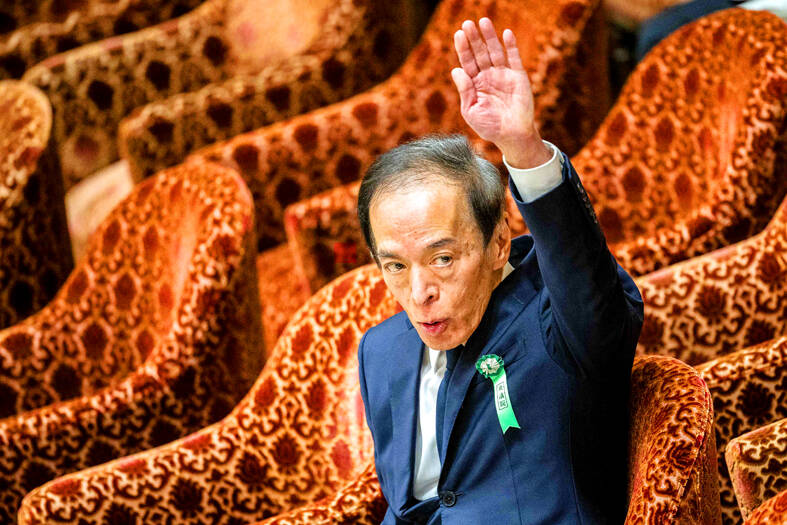The Bank of Japan (BOJ) left its ultra-easy monetary policy unchanged in its last meeting before Governor Haruhiko Kuroda steps down and is replaced by economics professor Kazuo Ueda.
While most analysts expected the Japanese central bank to stay the course in Kuroda’s final policy decision, some had speculated about a surprise tweak.
The bank left its long-standing negative interest rate in place and made no further adjustments to the band, in which rates for 10-year government bonds fluctuate.

Photo: AFP
The decision came shortly after Japan’s parliament approved Ueda as the BOJ’s next governor, paving the way for the 71-year-old to take over next month.
In recent months, the BOJ has steadfastly resisted tightening, even other developed economies have hiked rates to tackle inflation — a policy gap that has caused the yen to tumble against the US dollar.
Kuroda has insisted that the bank’s long-standing goal of sustained 2 percent inflation — considered necessary to turbocharge the world’s third-largest economy — has not yet been achieved.
Consumer prices hit 4.2 percent in January, driven by factors including higher fuel costs, but Kuroda has argued the rises are the result of temporary factors like the war in Ukraine.
He wants to see evidence of more sustained rises, including salary increases, before adjusting policy.
Ueda told lawmakers last month that he saw the “continuation of monetary easing as appropriate,” warning of uncertainty in financial markets and the global economy.
Current factors driving higher prices “will likely ebb in the future, and inflation in consumer prices will likely drop below 2 percent,” he said.
Ueda has a doctorate in economics from the Massachusetts Institute of Technology and is seen as a good communicator who prefers cautious reflection over abrupt action.
Kuroda, 78, is to step down at the end of his second term on April 8, after a tenure defined by his signature “bazooka” easy-money policies.
Since he took charge, the central bank’s assets have quadrupled, surpassing GDP, in a first for a G7 nation.
Analysts said Ueda would face a tough job in navigating a way forward for the BOJ, whose easy-money policies are viewed as unsustainable in the long term.
“While a policy change may not come any time soon, Japanese companies have already been preparing for an eventual shift, as shown by the high level of net cash they hold,” SuMi TRUST senior economist Hiroyuki Ueno said.
Santa Zvaigzne-Sproge, head of investment advice at Conotoxia, said inflation fueled by the strong dollar and supply chain problems linked to the COVID-19 pandemic and the Ukraine war would make sudden rate hikes a risky prospect for the bank.
“The BOJ has no control over the appreciation of the US dollar and supply shortages, as these are external factors,” she said.
“This means that raising interest rates at this time would not only have any noticeable effect on inflation, but would also put additional pressure on Japanese companies,” she said.

PERSISTENT RUMORS: Nvidia’s CEO said the firm is not in talks to sell AI chips to China, but he would welcome a change in US policy barring the activity Nvidia Corp CEO Jensen Huang (黃仁勳) said his company is not in discussions to sell its Blackwell artificial intelligence (AI) chips to Chinese firms, waving off speculation it is trying to engineer a return to the world’s largest semiconductor market. Huang, who arrived in Taiwan yesterday ahead of meetings with longtime partner Taiwan Semiconductor Manufacturing Co (TSMC, 台積電), took the opportunity to clarify recent comments about the US-China AI race. The Nvidia head caused a stir in an interview this week with the Financial Times, in which he was quoted as saying “China will win” the AI race. Huang yesterday said

Nissan Motor Co has agreed to sell its global headquarters in Yokohama for ¥97 billion (US$630 million) to a group sponsored by Taiwanese autoparts maker Minth Group (敏實集團), as the struggling automaker seeks to shore up its financial position. The acquisition is led by a special purchase company managed by KJR Management Ltd, a Japanese real-estate unit of private equity giant KKR & Co, people familiar with the matter said. KJR said it would act as asset manager together with Mizuho Real Estate Management Co. Nissan is undergoing a broad cost-cutting campaign by eliminating jobs and shuttering plants as it grapples

The Chinese government has issued guidance requiring new data center projects that have received any state funds to only use domestically made artificial intelligence (AI) chips, two sources familiar with the matter told Reuters. In recent weeks, Chinese regulatory authorities have ordered such data centers that are less than 30 percent complete to remove all installed foreign chips, or cancel plans to purchase them, while projects in a more advanced stage would be decided on a case-by-case basis, the sources said. The move could represent one of China’s most aggressive steps yet to eliminate foreign technology from its critical infrastructure amid a

MORE WEIGHT: The national weighting was raised in one index while holding steady in two others, while several companies rose or fell in prominence MSCI Inc, a global index provider, has raised Taiwan’s weighting in one of its major indices and left the country’s weighting unchanged in two other indices after a regular index review. In a statement released on Thursday, MSCI said it has upgraded Taiwan’s weighting in the MSCI All-Country World Index by 0.02 percentage points to 2.25 percent, while maintaining the weighting in the MSCI Emerging Markets Index, the most closely watched by foreign institutional investors, at 20.46 percent. Additionally, the index provider has left Taiwan’s weighting in the MSCI All-Country Asia ex-Japan Index unchanged at 23.15 percent. The latest index adjustments are to